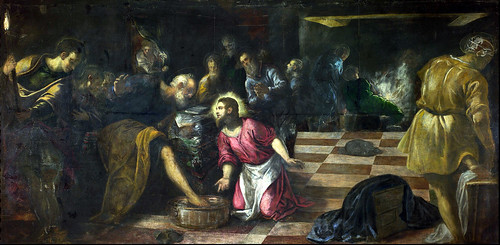Teach Us to Serve (Lent 4)
 Justin Dodd
Justin Dodd  Friday, April 20, 2012 at 08:34AM
Friday, April 20, 2012 at 08:34AM [This is the fourth of the mediations used during Lent at All Saints Ealing. In place of the sermon, the congregation are invited to reflect upon a work of art from the National Gallery. The reflection is accompanied by simple meditative music. The reflection is inspired by the lectionary readings for the day and two books: Nicholas Holtam's The Art of Worship and Anne Richards' Unreconciled - Exploring mission in an imperfect world. The selection of accompanying music as well as commentary on it is provided by the Director of Music - Gina Kruger.]
Jacopo Tintoretto, Christ washing the Feet of the Disciples, about 1575-80 (Coutesy of The National Gallery)

Whoever serves me must follow me,
and where I am, there will my servant be also.
Whoever serves me, the Father will honour.
John 12:26
Perhaps one of the most powerful and deceptive of emotions is pride. It is so easy to convince ourselves that we are doing something for another’s benefit when in fact we are the ones who are gaining. It is also very painful sometimes to let go of our agenda especially when we believe that it’s the right way to get things done.
Jesus is constantly challenging his disciples to shift their attention from themselves to him. A lot of the time he is simply saying, “Imitate what I am doing!” This is probably because serving others doesn’t come naturally or easily to us. We need Jesus to help us form the habit especially when our self-respect is at risk. It’s also because Christian life demands much more than the redirection of energy. If we choose to really follow Jesus, we inevitably find ourselves at the foot of the cross. It’s a vital paradox - faith finds its power in vulnerability and self-sacrifice, the willingness to offer yourself to another without calculating the risk or expecting a reward.
In this painting we see Christ, the light of the world, on his knees and washing what would have been the foulest part of the body – the feet. Ropy sandals, unsanitary city streets and sweat would have combined to make them so. Tintoretto has captured a fascinating insight into this ritual. Judas is on the right wiping his feet dry after having had them washed. Jesus has humbled himself and washed the sullied feet of the very person he knows will betray him. As we gaze at the painting it should dawn on us that the saviour’s remarkable gift of caritas (unlimited loving-kindness) to Judas is already in the past tense. It has been given without hesitation.
'Jesus Lord and Master, who served your disciples in washing
their feet: serve us often, serve us daily, in washing our motives,
our ambitions, our actions, that we may share with you in your
mission to the world and serve others gladly for your sake;
to whom be glory for ever. Amen
MICHAEL RAMSEY (1904-1988)








